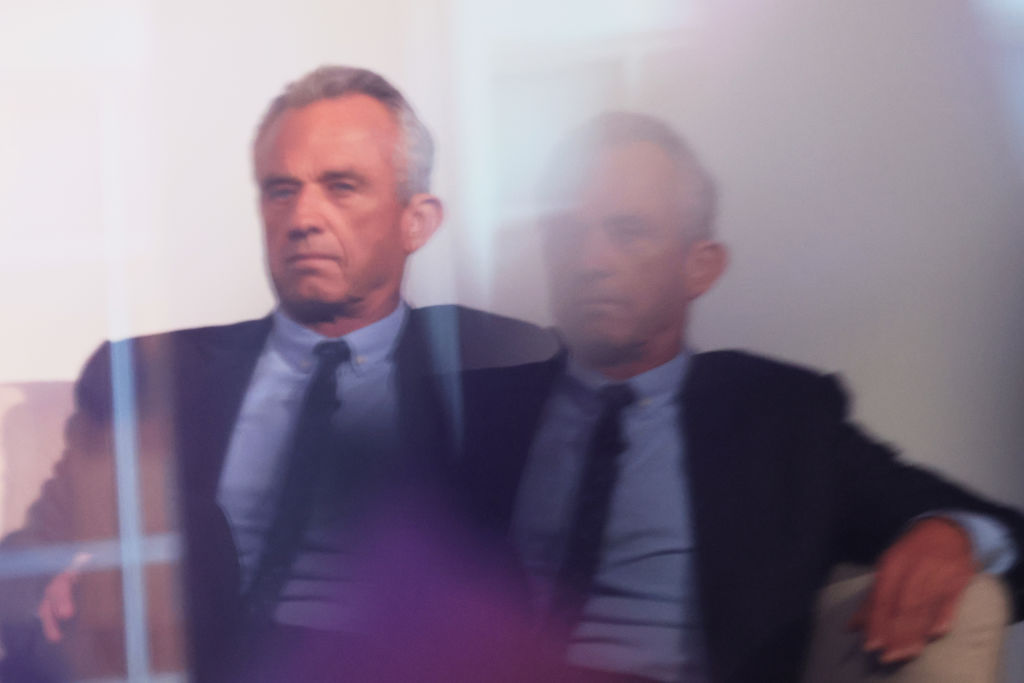
The last time I saw Robert F. Kennedy Jr. was just before COVID-19. I was hiking in the canyons above Los Angeles with a friend who Kennedy knew. We stopped, were all introduced, he looked apparationally like his father, as a Catholic it was like encountering a relic. Then he started talking to my friend about vaccines, trying to recruit him, or assure him, there was a whistleblower in the CDC about to come forward, documents produced, blow it all open, a figure whose name might have been Sidney Applebaum for all I know, because the day of reckoning never came.
The voice changes when we talk about conspiracies, we know it’s wrong to lie, and a conspiracy is a lie disguised in gossip. We don’t want the Gods to hear us, tones drop and darken, it affects even the coolest minds, “If they’re killing Kennedys, then my children are targets,” said Jackie Kennedy, before marrying a man who could protect her, the Minotaur Onassis. Who is they? No one knows, to speak of the Kennedys is to enter Catholic theology, the tremendum mysterium, awe-inspiring mystery.
The terms of a divine encounter, an immigrant fortune made in a great flood, the 1928 stock market crash ruining the WASP aristocracy, and elevating an Irish Catholic one generation removed from a genocide that Anglo-America is still uncomfortable discussing (“it’s complicated”) to awesome power. The fortune was vast. Joe Kennedy was brilliant. Catholics still whisper of the magic he worked, his shapeshifting, how he used his millions to vote gravestones down in West Virginia, actual necromancing, Joe Kennedy and the Italian and Jewish mobs, white ethnics, they used hard cash to raise up the dead, Protestant bigots of West Virginia who’d have kept anyone but their own mean tribe from power and they made those ghosts vote for an Irish Catholic who would advance Civil Rights, which only deepened the magic: Kennedy gave them the closest thing to redemption they’d ever know. We tell this story; giddily, that happened, my father would tell me. And of the miracle that followed, Jack, Bobby, Jackie, the clean lines, the beauty, the poetry, pre-Catholic, a ravishing encounter, Dionysian, right down to the slaughter in Dallas.
After his brother’s killing, Bobby Kennedy was as justified as anyone could be in brooding on conspiracies. He did, for a while, and then found refuge in lines from Aeschylus’ play Agamenon, lines he’d committed to memory by the time the same They that killed JFK assassinated Martin Luther King Jr. RFK received the news while addressing a Black audience in Indianapolis, and offered the only honest comfort he knew, voice humble, melodic; poetry as the aesthetic opposite of conspiracy, the lines from Aeschylus:
In our sleep, pain which cannot
Forget falls drop by drop upon
The heart until, in our despair,
Against our will, comes wisdom
Through the awful grace of God
He had barely two months to live.
COVID, as a tragedy of the flesh, was always going to rattle a man who lost his father to an assassin; his brother to an overdose; his wife to suicide. Who has been trafficking in vaccine conspiracy theories for years, and suggested recently that vaccination campaigns were probably responsible for HIV. Conspiracy of the flesh is Kennedy’s root allure, the bloody loam of his candidacy, and maybe even his psyche. In high empire, when God smiled upon man, the father reached for Aeschylus; in a later hour the son, in this dynasty that always self-defined in classical terms, is Odysseus, whose lies demand forgiving when we realize that whenever he tells the truth of his journey, he starts weeping against the unanswered pain, the loss, the self he never was; the fact, which any astute reader of The Odyssey sees, that he may not have even been a very good sailor, having lost the lives of all his men across his travels.
It’s hard to confront senseless tragedy. It’s easier to invent a story, and feel command over chaos, even if it amounts to a con. Bobby Junior has known mind-warping loss. Sometimes being is pain. Maybe he shares Odysseus’ dream, the one lie that is also a wish: to be Nobody, free from the pain of a name.
The first time I saw Bobby Kennedy Junior his brother David had just died of an overdose and I was preparing for kindergarten. This was Chappaqua, they wanted us to not be afraid of the bus, they had our fathers ride it with us to Friendly’s in Mt. Kisco, the town next door. My father worked hard to live in Westchester, he has a three-inch scar down his forearm from where plate glass cut him working on a glass truck, as a boy. When I think of the scar my heart fills for him. The bus pulls up to Friendly’s and there’s a stretch limousine outside, my father wonders, in 1984, simpler times, “Who takes a stretch limo for ice cream?” It was Bobby Kennedy Jr. He was just out of Hazelden for heroin, all wounds still fresh, if anyone had a right to seek oblivion, it was him.
So we all filed in and sat there at the Friendly’s counter, us kindergartners and Bobby Jr., with our ice creams and our fathers.
More Must-Reads from TIME
- Cybersecurity Experts Are Sounding the Alarm on DOGE
- Meet the 2025 Women of the Year
- The Harsh Truth About Disability Inclusion
- Why Do More Young Adults Have Cancer?
- Colman Domingo Leads With Radical Love
- How to Get Better at Doing Things Alone
- Michelle Zauner Stares Down the Darkness
Contact us at letters@time.com